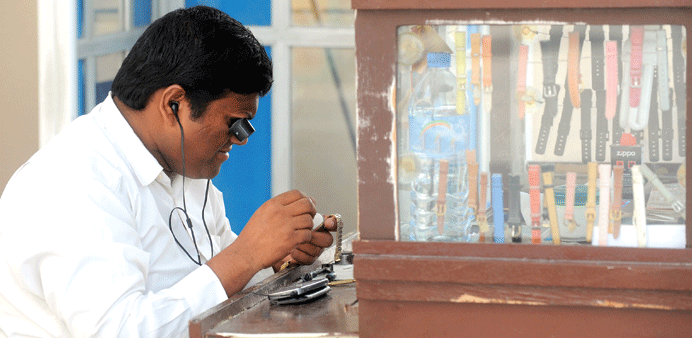By Nidhi Chandran
There was a time when people used to wear a wristwatch to check time. The digital revolution and emergence of cell phones have cut down their use and popularity over the years.
Today, wristwatches have become more of a fashion accessory. Some people say that increasing use of digital gadgets and mobile phones has led to the decline in interest for wearing wristwatches.
Yet, there are a large number of people in Doha who cannot replace a watch with mobile phone. The presence of many watch repairing outlets and street kiosks around Qatar also indicates that people here haven’t totally abandoned the habit of wearing a watch.
There is a large section of workers mostly from Bangladesh and Pakistan who have come to Qatar due to the unemployment and political instability in their homeland and make a living out of watch repairing. You will notice a number of them sitting in cabinet-like stalls on Doha’s streets, in the souq area and outside many shopping complexes like the New World Center in New Ghanim, outside Sana Fashion in Mughalina, Parco Mall and Shaheen complex in Muntaza to name a few.
Be it winter or scorching summer, they work the whole day.
In order to set up a stall and run the business, they have to get a licence from Qatar Municipality and need to pay around QR500 every year. They also have to take permission from authorities at shopping complexes to get a space outside and sometimes have to pay them a fixed amount on a monthly basis as well.
These workers are preferred by many customers because they are easy to locate, and also charge much less. Changing a battery or a strap takes only five to 10 minutes in these kiosks.
The watch repairers may not be professionals or degree holders, but years of experience have made them experts in their field. A few minutes’ talk with them would reveal their knowledge about available brands in the market. Some of them also repair clocks.
Mohamed Nazeerudheen came to Qatar 22 years back and since then he has been a watch repairer. His stall in front of the New World Center stocks straps, batteries, a glass cutting machine and some tools bought from the wholesale markets in souqs. Unlike some of the repairers who work only during the evening, he opens the shop at 9am and closes it at 10.30pm, taking a lunch break in between.
“I came here in 1991 and started this business thinking that I could send back some money to my family living in Bangladesh. Though business has gone down compared to early years, there are still people who wear watches and come here for changing batteries, straps and also for spare parts.
“If there are more people, I earn around QR100 a day and sometimes more than that. During summer, it is really difficult to sit without a sunshade. Now the windy weather is also giving trouble during night. Since we have no other choice, we need to cope up with this, otherwise our families cannot survive,” he says.
Compared to other high-end outlets, service charges at these shops is less. A battery costs around QR10, though depending on the expertise required, the watch it may go up to QR100. “Some people bring branded items which are difficult to open and takes more time to work on it. They may be charged around QR60-70 for changing a battery. Repairing work has come down in past few years as more people are using automatic items,” adds Nazeerudheen who has customers from all nationalities.
At his stall, watch straps are available for a nominal QR5 to QR100 and he adds “leather straps are more saleable.”
“I live near a mall where a watchmaker is available all-day outside the complex. It is easy for me to go to him for a simple battery or strap change rather going to another shop which may take time and cost more. These people charge very less and their service is beneficial for middle-class workers or labourers who cannot afford to buy a new one. I had changed the battery of a branded watch one month back at his shop and it is working perfectly. If I had gone to the showroom it would have cost me more,” said Satheesh, an expatriate.
Irfan was seen waiting for customers at his stall in Najma area. A few straps were hanging inside a glass shelf at his kiosk and two timepieces are placed on the table. He has been running it for the past one and half years. “I don’t get many customers these days. Earlier, I used to get around 10 people a day but business has been worse in past few days, may be due to the weather,” he lamented.
Some of are content with their job being able to keep a few customers but others still continue their struggle to survive.

A watch repairer at work in Doha. Photograph: Jayan Orma
